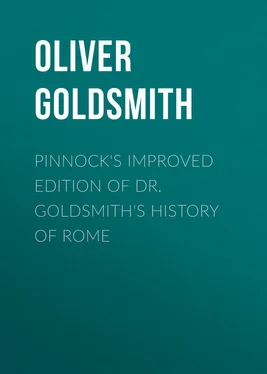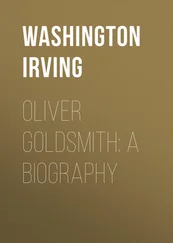Oliver Goldsmith - Pinnock's improved edition of Dr. Goldsmith's History of Rome
Здесь есть возможность читать онлайн «Oliver Goldsmith - Pinnock's improved edition of Dr. Goldsmith's History of Rome» — ознакомительный отрывок электронной книги совершенно бесплатно, а после прочтения отрывка купить полную версию. В некоторых случаях можно слушать аудио, скачать через торрент в формате fb2 и присутствует краткое содержание. Издательство: Иностранный паблик, Жанр: foreign_antique, foreign_prose, на английском языке. Описание произведения, (предисловие) а так же отзывы посетителей доступны на портале библиотеки ЛибКат.
- Название:Pinnock's improved edition of Dr. Goldsmith's History of Rome
- Автор:
- Издательство:Иностранный паблик
- Жанр:
- Год:неизвестен
- ISBN:нет данных
- Рейтинг книги:4 / 5. Голосов: 1
-
Избранное:Добавить в избранное
- Отзывы:
-
Ваша оценка:
- 80
- 1
- 2
- 3
- 4
- 5
Pinnock's improved edition of Dr. Goldsmith's History of Rome: краткое содержание, описание и аннотация
Предлагаем к чтению аннотацию, описание, краткое содержание или предисловие (зависит от того, что написал сам автор книги «Pinnock's improved edition of Dr. Goldsmith's History of Rome»). Если вы не нашли необходимую информацию о книге — напишите в комментариях, мы постараемся отыскать её.
Pinnock's improved edition of Dr. Goldsmith's History of Rome — читать онлайн ознакомительный отрывок
Ниже представлен текст книги, разбитый по страницам. Система сохранения места последней прочитанной страницы, позволяет с удобством читать онлайн бесплатно книгу «Pinnock's improved edition of Dr. Goldsmith's History of Rome», без необходимости каждый раз заново искать на чём Вы остановились. Поставьте закладку, и сможете в любой момент перейти на страницу, на которой закончили чтение.
Интервал:
Закладка:
8. Tullus having greatly increased the power and wealth of Rome by repeated victories, now thought proper to demand satisfaction of the Sab'ines for the insults which had been formerly offered to some Roman citizens at the temple of the goddess Fero'nia, which was common to both nations A war ensued, which lasted some years, and ended in the total overthrow of the Sab'ines.
Hostil'ius died after a reign of thirty-two years; some say by lightning; others, with more probability, by treason.
Questions for Examination .
1. On whom devolved the government on the death of Numa, and what is the character of his successor?
2. What opportunity first offered of indulging the new king's inclinations?
3. What proposal was offered, and accepted for deciding the dispute?
4-6. Relate the circumstances which attended the combat, and the result of it.
7. What act followed the victory?
8. What conquest was next achieved?
CHAPTER V.
FROM THE DEATH OF TULLUS HOSTILIUS TO THE DEATH OF ANCUS MARTIUS THE FOURTH KING OF ROME. – U.C. 115
Where what remains
Of Alba, still her ancient rights retains,
Still worships Vesta, though an humbler way,
Nor lets the hallow'd Trojan fire decay. — Juvenal .
1. After an interregnum, as in the former case, Ancus Mar'tius, the grandson of Numa, was elected king by the people, and their choice was afterwards confirmed by the senate. As this monarch was a lineal descendant from Numa, so he seemed to make him the great object of his imitation. He instituted the sacred ceremonies, which were to precede a declaration of war; 62 62 First an ambassador was sent to demand satisfaction for the alleged injury; if this were not granted within thirty-three days, heralds were appointed to proclaim the war in the name of the gods and people of Rome. At the conclusion of their speech, they threw their javelins into the enemy's confines, and departed.
but he took every occasion to advise his subjects to return to the arts of agriculture, and to lay aside the less useful stratagems of war.
2. These institutions and precepts were considered by the neighbouring powers rather as marks of cowardice than of wisdom. The Latins therefore began to make incursions upon his territories, but their success was equal to their justice. An'cus conquered the Latins, destroyed their cities, removed their inhabitants to Rome, and increased his dominions by the addition of part of theirs. He quelled also an insurrection of the Ve'ii , the Fiden'ates , and the Vol'sci ; and over the Sab'ines he obtained a second triumph.
3. But his victories over the enemy were by no means comparable to his works at home, in raising temples, fortifying the city, making a prison for malefactors, and building a sea-port at the mouth of the Ti'ber, called Os'tia, by which he secured to his subjects the trade of that river, and that of the salt-pits adjacent. Thus having enriched his subjects, and beautified the city, he died, after a reign of twenty-four years.
Questions for Examination .
1. Who was elected by the people after the interregnum, and what measures did he pursue?
2. In what light did his enemies consider his institutions? With what success did they oppose him?
3. What were the other acts of Ancus? How many years did he reign?
CHAPTER VI.
FROM THE DEATH OF ANCUS MARTIUS, TO THE DEATH OF TARQUINIUS PRISCUS THE FIFTH KING OF ROME. – U.C. 130
The first of Tarquin's hapless race was he,
Who odium tried to cast on augury;
But Nævius Accius, with an augur's skill.
Preserved its fame, and raised it higher still. — Robertson .
1. Lu'cius TARQUIN'IUS PRIS'CUS was appointed guardian to the sons of the late king, and took the surname of Tarquin'ius from the city of Tarquin'ia , whence he last came. His father was a merchant of Corinth, 63 63 Corinth (now Corito) was a celebrated city of ancient Greece, situated on the isthmus of that name, about sixty stadia or furlongs from the sea. Its original name was Ephy're.
who had acquired considerable wealth by trade, and had settled in Italy, upon account of some troubles at home. His son, who inherited his fortune, married a woman of family in the city of Tarquin'ia.
2. His birth, profession, and country, being contemptible to the nobles of the place, he, by his wife's persuasion, came to settle at Rome, where merit also gave a title to distinction. On his way thither, say the historians, as he approached the city gate, an eagle, stooping from above, took off his hat, and flying round his chariot for some time, with much noise, put it on again. This his wife Tan'aquil, who it seems was skilled in augury, interpreted as a presage that he should one day wear the crown. Perhaps it was this which first fired his ambition to pursue it.
3. Ancus being dead, and the kingdom, as usual, devolving upon the senate, Tarquin used all his power and arts to set aside the children of the late king, and to get himself elected in their stead. For this purpose, upon the day appointed for election, he contrived to have them sent out of the city; and in a set speech, in which he urged his friendship for the people, the fortune he had spent among them, and his knowledge of their government, he offered himself for their king. As there was nothing in this harangue that could be contested, it had the desired effect, and the people, with one consent, elected him as their sovereign.
4. A kingdom thus obtained by intrigue , was, notwithstanding, governed with equity. In the beginning of his reign, in order to recompense his friends, he added a hundred members more to the senate, which made them, in all, three hundred.
5. But his peaceful endeavours were soon interrupted by the inroads of his restless neighbours, particularly the Latins, over whom he triumphed, and whom he forced to beg for peace. He then turned his arms against the Sabines, who had risen once more, and had passed the river Ti'ber; but attacking them with vigour, Tarquin routed their army; so that many who escaped the sword, were drowned in attempting to cross over, while their bodies and armour, floating down to Rome, brought news of the victory, even before the messengers could arrive that were sent with the tidings. These conquests were followed by several advantages over the Latins, from whom he took many towns, though without gaining any decisive victory.
6. Tarquin, having thus forced his enemies into submission, was resolved not to let his subjects grow corrupt through indolence. He therefore undertook and perfected several public works for the convenience and embellishment of the city. 64 64 Preparations for building the Capitol were made in this reign. The city was likewise fortified with stone walls, and the cloacæ, or common sewers, constructed by the munificence of this prince. (See Introd.)
7. In his time it was, that the augurs came into a great increase of reputation. He found it his interest to promote the superstition of the people; for this was, in fact, but to increase their obedience. Tan'aquil, his wife, was a great pretender to this art; but Ac'cius Næ'vius was the most celebrated adept of the kind ever known in Rome. 8. Upon a certain occasion, Tarquin, being resolved to try the augur's skill, asked him, whether what he was then pondering in his mind could be effected? Næ'vius, having consulted his auguries, boldly affirmed that it might: "Why, then," cries the king, with an insulting smile, "I had thoughts of cutting this whetstone with a razor." "Cut boldly," replied the augur; and the king cut it through accordingly. Thenceforward nothing was undertaken in Rome without consulting the augurs, and obtaining their advice and approbation.
Читать дальшеИнтервал:
Закладка:
Похожие книги на «Pinnock's improved edition of Dr. Goldsmith's History of Rome»
Представляем Вашему вниманию похожие книги на «Pinnock's improved edition of Dr. Goldsmith's History of Rome» списком для выбора. Мы отобрали схожую по названию и смыслу литературу в надежде предоставить читателям больше вариантов отыскать новые, интересные, ещё непрочитанные произведения.
Обсуждение, отзывы о книге «Pinnock's improved edition of Dr. Goldsmith's History of Rome» и просто собственные мнения читателей. Оставьте ваши комментарии, напишите, что Вы думаете о произведении, его смысле или главных героях. Укажите что конкретно понравилось, а что нет, и почему Вы так считаете.











